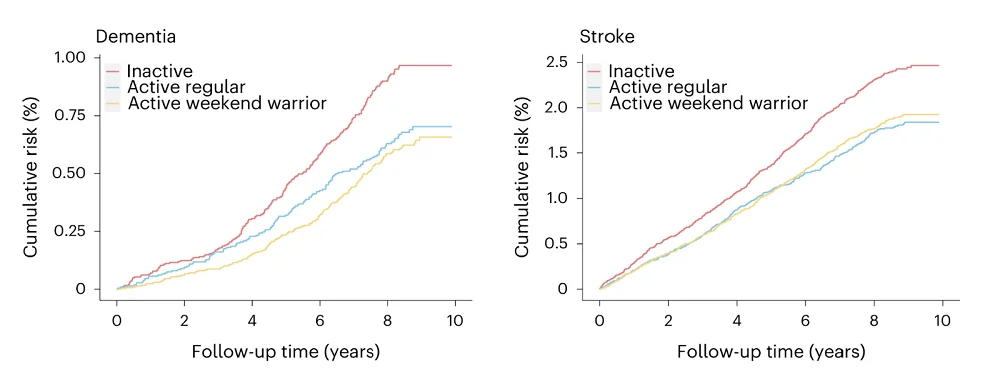Weekend-Oriented Physical Activity Superior for Brain Health
- Concentrated weekend exercise has advantages over regular daily exercise.

According to a new study, “weekend warriors”, people who have most of their physical activity over one or two days a week, enjoy the most robust risk reduction for several brain health-related conditions [1].
Couch potato, except on weekends
Exercise is universally necessary to stay healthy for longer. It is one of the three staples of healthy longevity, along with a good diet and sleep. However, for people who work standard 40-hour weeks at sedentary jobs, it can be difficult to maintain healthy levels of physical activity. Many people clock most of their exercise hours on weekends, which can be done more enjoyably than on a treadmill, such as by hiking or skiing.
However, it was questioned whether this kind of physical activity provides the same health benefits as exercising more regularly. Last year, a study showed that, when it comes to lowering the risk of cardiovascular diseases, the answer is mostly yes [2].
This time, a group of scientists decided to check the same hypothesis with regard to brain health. Their study, published in Nature Aging, uses the same data source: UK Biobank, a vast repository of health information on hundreds of thousands of British citizens.
Some of them wore professional-grade accelerometers for a week to record their physical activity, and this data engendered a trove of studies. A week might not seem long, but research has shown that in sufficiently large samples, it is representative enough of regular exercise patterns.
“Weekend warriors” are the largest group
The researchers divided their sample of 75,000 participants into three categories: inactive (less than 150 minutes of moderate-to-vigorous physical activity, or MVPA), “weekend warriors” (more than 150 minutes of MVPA, with more than 50% of it occurring over the course of 1-2 days a week), and regular exercisers (more than 150 minutes of MVPA spread more evenly).
150 minutes of MVPA per week is an amount that lies somewhere in the middle of the current WHO recommendations for physical activity: “All adults should undertake 150–300 min of moderate-intensity, or 75–150 min of vigorous-intensity physical activity, or some equivalent combination of moderate-intensity and vigorous-intensity aerobic physical activity, per week.” [3]
One example of moderate activity is brisk walking that still allows you to maintain a conversation, while running is already considered a vigorous activity. A more technical definition is 3-6 metabolic equivalents of task (METs) or more than 6 METs, respectively.
The study population was relatively old, with an average age of 62. Interestingly, the proportion of “weekend warriors” was the highest (40%), followed by physically inactive (32%) and regular exercisers (28%). The researchers controlled for a variety of confounding variables, including age, sex, diet, smoking, alcohol consumption, and relevant health conditions: diabetes, hypertension, and cancer. The median follow-up period was 8.4 years.
Weekend warriors reign supreme
The results were somewhat surprising: not only “weekend warriors” did much better than the inactive participants, but they also beat regular exercisers. Compared to the inactive group, weekend warriors enjoyed a 26% risk reduction for dementia, 21% for stroke, 45% for Parkinson’s disease, 40% for depression, and 37% for anxiety disorder. For regular exercisers, the reduction in dementia risk was only 9% and did not reach statistical significance. For other conditions, the results of weekend warriors and regular exercisers were closer, although in the fully adjusted model, risk reduction for stroke in regular exercisers landed below the statistical significance threshold.

This picture generally held true for all ages and both sexes. However, risk reductions for dementia, stroke, and Parkinson’s disease were slightly more pronounced in people over 65.
This study had several limitations, including a rather coarse-grained division into groups. Despite that, its results are intriguing and warrant further investigation. If the superiority of the “weekend warrior” pattern is confirmed, it would be interesting to understand the reasons behind it. One such reason might conceivably be that weekend activities provide increased stimulation for the brain compared to going to the gym.
In this large population-based cohort study, we found that adhering to the weekend warrior pattern was similarly associated with a lower risk of both neurological diseases and psychiatric disorders in regularly active individuals. The findings were almost consistent after adjusting for various covariates, including sociodemographical factors, lifestyles and health conditions.
Literature
[1] Min, J., Cao, Z., Duan, T., Wang, Y., & Xu, C. (2024). Accelerometer-derived ‘weekend warrior’ physical activity pattern and brain health. Nature Aging, 1-9.
[2] Khurshid, S., Al-Alusi, M. A., Churchill, T. W., Guseh, J. S., & Ellinor, P. T. (2023). Accelerometer-Derived “Weekend Warrior” Physical Activity and Incident Cardiovascular Disease. JAMA, 330(3), 247-252.
[3] Bull, F. C., Al-Ansari, S. S., Biddle, S., Borodulin, K., Buman, M. P., Cardon, G., … & Willumsen, J. F. (2020). World Health Organization 2020 guidelines on physical activity and sedentary behaviour. British journal of sports medicine, 54(24), 1451-1462.







